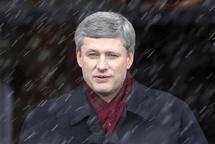
The main event comes on Wednesday when he will observe Operation Nanook, an annual military exercise trumpeting Canada's sovereignty over a large swath of Arctic territory to the east of Baffin Island.
Five countries bordering the Arctic -- Canada, Denmark, Norway, Russia and the United States -- claim overlapping parts of the region, which is estimated to hold 90 billion untapped barrels of oil.
Harper will board a frigate and then a submarine as it dives into the icy waters near Iqaluit, Brigadier-General David Millar, commander of Joint Task Force North, told public broadcaster CBC.
In its fifth year, the Canadian military exercises -- running from August 6 to August 28 -- are the biggest they have ever been. "We're growing our capability, and ramping up," navy spokesman Lieutenant Jordan Holder told AFP.
This year it includes 700 personnel, aircraft patrolling the Hudson and Davis Straits, as well as the frigate HMCS Toronto and submarine HMCS Corner Brook, which will take part in anti-submarine warfare exercises along Canada's northern frontier.
"It's the first time that we have an anti-submarine component to the exercise," Holder said. "It's meant to demonstrate our ability to respond to reports of unauthorized activity both above and below the surface."
One exercise in the war games will see commandos specially trained and equipped for Arctic deployment make an amphibious landing on a remote island, he said.
Canada announced last year it was stepping up its military alertness along its northern frontier in response to Russia "testing" its boundaries with military flights skirting the border which had not seen since the Cold War.
Ottawa responded with plans for a sensor net, more navy patrols and a military training camp in the far north.
The United Nations Convention on the Law of the Sea stipulates that any coastal state can claim undersea territory 200 nautical miles from their shoreline and exploit the natural resources within that zone.
Nations can also extend that limit to up to 350 nautical miles from their coast if they can provide scientific proof that the undersea continental plate is a natural extension of their territory.
Moscow believes it should control the Northern Sea Route, a passage that stretches from Asia to Europe across northern Russia, and in 2007 planted a flag on the ocean floor beneath the North Pole in a symbolic staking of its claim over the region.
Canada meanwhile has claimed the famed Northwest Passage, but is at odds with the United States which considers it to be international waters.
Later in the week, Harper is to travel to the Inuit hamlet Pangnirtung, on Baffin Island, and to Yellowknife and Whitehorse, the regional capitals of the Northwest Territories and the Yukon respectively.
------------------------------------------------------------------------------------------------------------------------
Five countries bordering the Arctic -- Canada, Denmark, Norway, Russia and the United States -- claim overlapping parts of the region, which is estimated to hold 90 billion untapped barrels of oil.
Harper will board a frigate and then a submarine as it dives into the icy waters near Iqaluit, Brigadier-General David Millar, commander of Joint Task Force North, told public broadcaster CBC.
In its fifth year, the Canadian military exercises -- running from August 6 to August 28 -- are the biggest they have ever been. "We're growing our capability, and ramping up," navy spokesman Lieutenant Jordan Holder told AFP.
This year it includes 700 personnel, aircraft patrolling the Hudson and Davis Straits, as well as the frigate HMCS Toronto and submarine HMCS Corner Brook, which will take part in anti-submarine warfare exercises along Canada's northern frontier.
"It's the first time that we have an anti-submarine component to the exercise," Holder said. "It's meant to demonstrate our ability to respond to reports of unauthorized activity both above and below the surface."
One exercise in the war games will see commandos specially trained and equipped for Arctic deployment make an amphibious landing on a remote island, he said.
Canada announced last year it was stepping up its military alertness along its northern frontier in response to Russia "testing" its boundaries with military flights skirting the border which had not seen since the Cold War.
Ottawa responded with plans for a sensor net, more navy patrols and a military training camp in the far north.
The United Nations Convention on the Law of the Sea stipulates that any coastal state can claim undersea territory 200 nautical miles from their shoreline and exploit the natural resources within that zone.
Nations can also extend that limit to up to 350 nautical miles from their coast if they can provide scientific proof that the undersea continental plate is a natural extension of their territory.
Moscow believes it should control the Northern Sea Route, a passage that stretches from Asia to Europe across northern Russia, and in 2007 planted a flag on the ocean floor beneath the North Pole in a symbolic staking of its claim over the region.
Canada meanwhile has claimed the famed Northwest Passage, but is at odds with the United States which considers it to be international waters.
Later in the week, Harper is to travel to the Inuit hamlet Pangnirtung, on Baffin Island, and to Yellowknife and Whitehorse, the regional capitals of the Northwest Territories and the Yukon respectively.
------------------------------------------------------------------------------------------------------------------------









 Home
Home Politics
Politics









